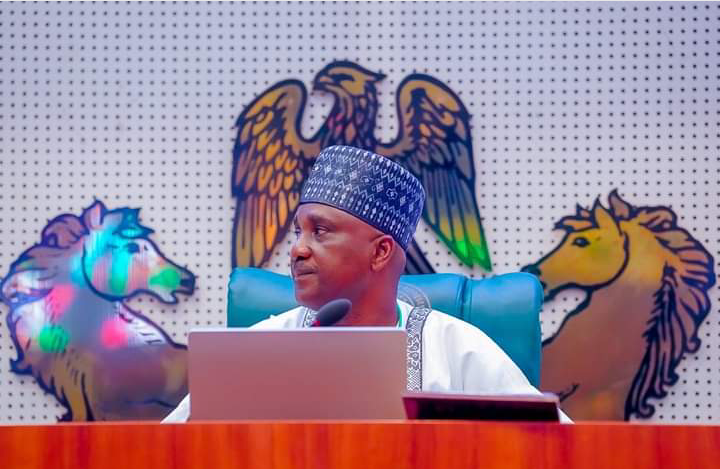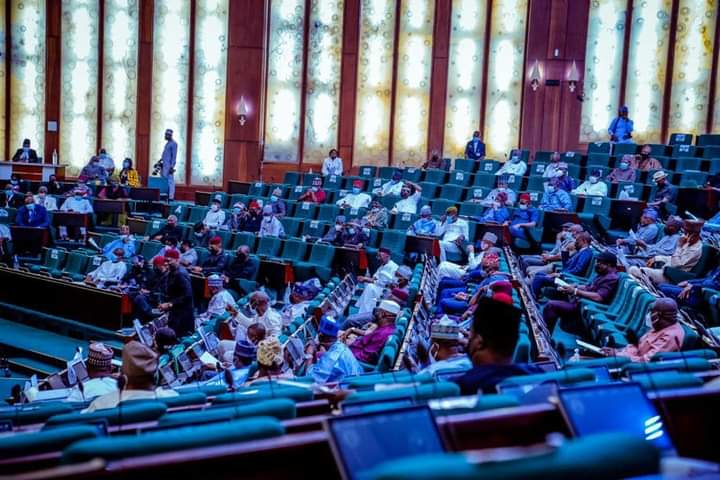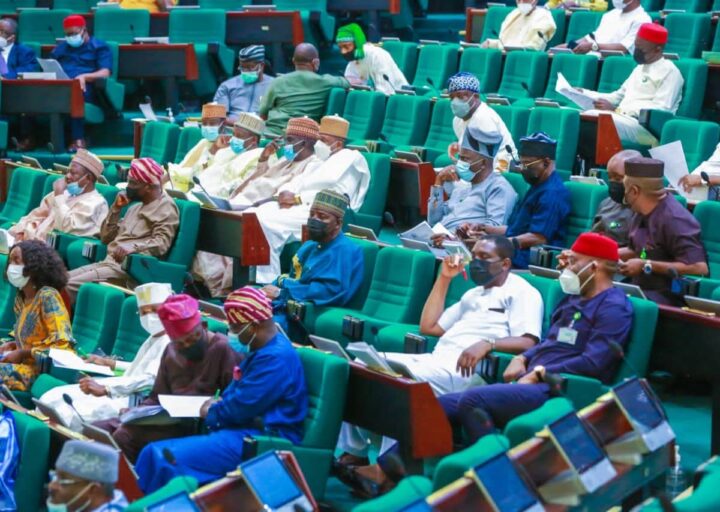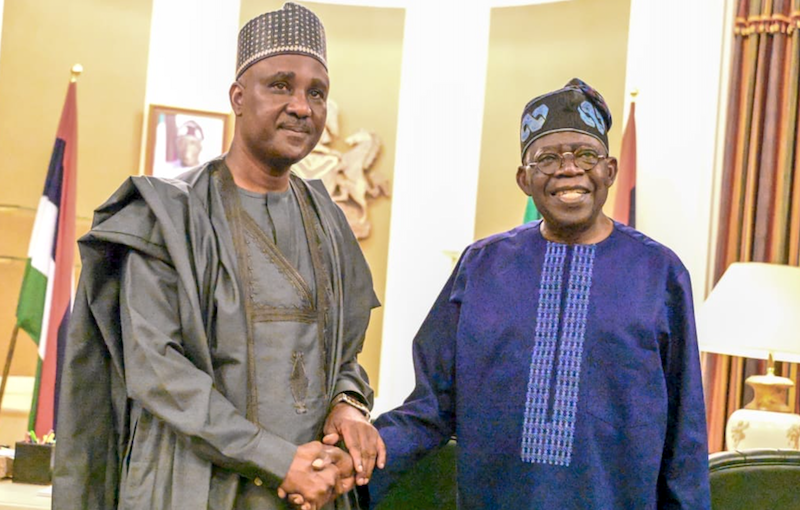Speaker of the Nigerian House of Representatives, Rt Hon Tajudeen Abbas has said the National Assembly (NASS) has no fixed position on the matter of the creation of State Police.
TheNewsGuru.com (TNG) reports Abbas said this on Monday at a one-day national dialogue on security and state police organised by the House of Representatives.
In his keynote address, Speaker Abbas highlighted President Bola Tinubu’s commitment to overhauling and transforming the Nigeria Police Force into a modern, professional and accountable institution is evident and commendable.
Earlier this year, President Tinubu and State Governors opened up the conversation on “the possibility of setting up State Policing.”
The President had set up a Constitutional Review Committee in 2023, comprising the National Security Adviser, Chairman of the Police Service Commission, and the Chairman of the Nigerian Governors’ Forum to make recommendations towards “comprehensive” police reforms, particularly because no extensive and systematic reforms had taken place in the Nigerian Police Force since its creation in 1861.
Abbas stressed the national dialogue was convened to support recent attempts on police reforms and multi-level policing. The attempts he said include the Police Repeal and Re-enactment Act of 2020, and the Police Trust Fund Act of 2019.
The Speaker said: “This is in line with the constitutional mandate of the National Assembly to make laws for the order, peace and good governance of the country as contained in the 1999 Constitutions.
“It is also in line with our Legislative Agenda priorities to undertake judicial reform, promote rule of law and human rights; streamline and improve the constitutional reform process; and improve national security.
“As legislators, we are tasked with crafting laws that address our people’s immediate needs and anticipate and mitigate future challenges. Our role in security law-making is to ensure that any initiative, such as establishing State Policing, adheres to our Constitution and aligns with the broader goals of national security and public welfare.
“Furthermore, legislative oversight is essential to ensure that these laws are implemented effectively and continue to serve the best interests of the Nigerian people.
“Through our committees and investigative processes, the National Assembly has a duty to monitor, review, and refine the operations of security agencies to prevent any abuses of power and safeguard citizens’ rights and freedoms.
“The House of Representatives is aware of the divisive and polarising arguments surrounding the issue under review. Let me state categorically that the House and indeed the National Assembly does not have a fixed position.
“Our role is to facilitate a dialogue and generate consensus. In discussions as significant as this, it is imperative that we approach each debate with objectivity and neutrality.
“We must acknowledge our biases and set them aside in favour of what is most beneficial for our dear country. Our discussions should be marked not by the pursuit of personal or political gains but by a steadfast commitment to the common good”.
Abbas assured that the National Assembly, as the largest representative and deliberative body in Nigeria, is uniquely positioned to facilitate this dialogue with a spirit of openness and sincerity.
“We are the bridge between the Government and the governed, between different political ideologies, and between the present needs and future aspirations of our nation. Creating State Policing systems requires more than just legislative action; it requires a national consensus.
“As diverse and complex as our great country is, so too are the opinions and perspectives on how best to manage and implement local policing. It is only through open, inclusive, and respectful dialogue – like the one we are part of today – that we can build the necessary consensus.
“It is crucial that every voice is heard, from the northern reaches of our Sahel to the coastal hubs in the south. Each region and geo-political zone has its unique challenges and insights.
“By embracing these differences and working through them together, we can forge policies that are robust, equitable, and tailored to the specific needs of each community.
“Our mission here is simple: to deliberate the future of policing in Nigeria, reflecting on our historical context and aligning our actions with the demands of our diverse and dynamic populace and daunting contemporary security challenges that have stretched our existing system to a breaking point,” Abbas said.
The Speaker explained the concept of State Police involves decentralising law enforcement functions to the State level, thereby allowing for more localised and responsive policing tailored to the unique needs of each State.
“However, Section 214 of the 1999 Constitution establishes the Nigerian Police Force as unitary police “for the Federation or any part thereof”.
“However, as noted earlier, evolving security challenges and other institutional and structural challenges have severely affected the general effectiveness of the police.
“As you are mostly aware, this deficit has resulted in the military engaging in policing functions in all States of the Federation, including the FCT. In turn, this has also overstretched the armed forces and affected their effectiveness in combatting other broader security challenges, including those that threaten the territorial integrity of Nigeria.
“In view of the above, many have argued that a decentralised and community-based approach to policing has become imperative to empower the States to address the complex security challenges in the context of their local environment and peculiarities.
“Some see the current centralised structure of the police as a negation of ‘true federalism’. Several countries structured as Federations have well-established state, provincial, or regional police that exercise authority over relevant sub-national jurisdictions and collaborate on law enforcement matters with national or federal police, where both exist.
“Some of the Federal Countries with functional decentralised policing systems include Brazil, the United States of America, Argentina, Canada, Spain, Germany and India, among others. Other decentralised policing countries include Pakistan, Botswana, the United Kingdom and Mexico.
“On this note, I would like to thank the Ambassadors of these respective countries to Nigeria for accepting to share their experiences with us at this forum.
“As we delve into the substance of today’s dialogue, please permit me to highlight a few issues that I think are critical to the overall conversation on the merits and demerits of State Policing and its desirability or otherwise for Nigeria.
“First and foremost, it is imperative to acknowledge that the push for reforming our police forces is not merely desirable but necessary. We are at a stage where public trust in law enforcement is teetering.
“Also, the burden of policing the vast geographical expanse of our country and a rapidly expanding population warrants a reform of the current structure.
“The need for a system that maintains law and order and upholds every Nigerian’s dignity and rights cannot be overstated. Reform is essential to heal and to build – rebuilding trust, rebuilding effectiveness, and rebuilding our shared commitment to justice.
“Secondly, whereas most Nigerians agree on the need to reform policing, that is usually where the consensus ends. There is no agreement on how best to proceed with the reform or the best policing model for Nigeria. In considering the path forward, we must recognise that no one-size-fits-all solution exists.
“The vast diversity of Nigeria, with over 300 ethnic groups and a range of geographic, economic, and social conditions, requires a policing model that is adaptable and sensitive to local contexts. As we explore the models of State Policing that have been successful in other nations, we must be judicious in adapting these frameworks to fit our unique Nigerian context.
“Furthermore, it is also important to remind ourselves that decentralised policing is not alien to Nigeria. Historically, during both the colonial and immediate post-colonial periods, Nigeria operated under a system where local police forces played significant roles in maintaining public order specific to their regions.
“Policing in colonial times was purely decentralised, as evidenced by the Lagos Police Force, Hausa Constabulary and Niger Coast Constabulary. The structure was maintained even after the merger of the Northern and Southern Protectorates with the creation of the Northern Nigeria Police and the Southern Nigeria Police. In fact, under the First Republic, these forces were first regionalised before their subsequent nationalisation.
“However, subsequent civilian and military governments adopted a rigidly centralised pattern for the Nigeria Police. As such, you should take cognisance of the fact that decentralised policing is not an entirely new proposition. The historical precedent supports the notion that a decentralised approach can be beneficial and effective if properly managed.
“However, we must proceed with caution. There is a palpable fear among our citizens – a fear of potential tyranny and the misuse of police powers if control is devolved to the State level. These concerns are not unfounded and must be addressed frontally, without bias or sentiments.
“This emphasizes the need for robust frameworks that ensure accountability, transparency, and equitable service delivery across all States. Equally important are setting stringent national standards, establishing oversight bodies, and involving communities in the policing process.
“As earlier noted, the House of Representatives, and by extension, the National Assembly, will facilitate consensus building towards strengthening security and policing structures to protect lives and properties better.
“Whatever model Nigerians adopt, our focus must always be on developing a police system that is efficient, responsible, responsive and subject to global best practice in its management and operation.
“In conclusion, I task you to debate freely on the pros and cons of state policing. As we engage, issues to consider may include but not limited to the following: the desirability or otherwise of State Policing, the timeframe for a transition if deemed desirable, suitable model or models for Nigeria that account for context and diversity, appropriate legal and institutional frameworks, essential safeguards against abuse, continuous review and oversight mechanisms, financial arrangements between the different levels of Governments, modality for recruitment, management, operation and relationship between State Police and the Federal Police, among others.
“Given the array of expertise, knowledge and experience gathered here today, I sincerely hope that this dialogue will deliver outcomes that will further enrich and enhance our legislative work and interventions necessary for the peace, security and development of our dear country.
“We look forward to a robust national exchange of ideas and your recommendations for necessary legislative action. The outcome of today’s discussions will contribute in creating the best option for Nigeria,” Abbas said.



